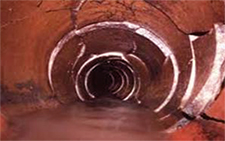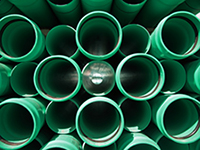04 Feb How Long Do Sewer Pipes Last?
When it comes to sewer lines, the length of time the sewer pipes will last is dependent on the material that was used to create them. There are two basic types of materials that were used to create sewer lines.
- Prior to 1980 clay pipes were used.
- After 1980 PVC pipe was/is used.
 Clay pipes were an economical way for builders and sewer workers to create a main sewer line prior to 1980. Additionally, PVC was not widely used during this time, which made clay pipes the most logical option. Clay sewer pipes can typically last for 50 to 60 years.
Clay pipes were an economical way for builders and sewer workers to create a main sewer line prior to 1980. Additionally, PVC was not widely used during this time, which made clay pipes the most logical option. Clay sewer pipes can typically last for 50 to 60 years.
 PVC (polyvinyl chloride) pipe was designed to last for long periods of time, typically over 100 years. After 1980 this pipe replaced the old version of clay pipes as the “go to” piping for sewer lines. However, both types of piping will eventually wear out. While they are estimated to last a certain amount of time, this does not mean they necessarily will.
PVC (polyvinyl chloride) pipe was designed to last for long periods of time, typically over 100 years. After 1980 this pipe replaced the old version of clay pipes as the “go to” piping for sewer lines. However, both types of piping will eventually wear out. While they are estimated to last a certain amount of time, this does not mean they necessarily will.
The simple fact is, no matter how long your sewer lines should last, you should be aware of the warning signs of a broken sewer line. Some classic examples that your sewer line needs repairs or to be replaces include:
- Foul or strange odor in your yard. As pipes age, both clay and PVC, they may become cracked or damaged. As a result the substances that flow through them will begin seeping to the top of the ground. This is a classic indication that it is time to replace or re-line the sewer lines for your home.
- Another tell-tale sign occurs in a highly used area of your home: the bathroom. Strange gurgling sounds, sludge in the bathtub and other nasty problems can occur when your sewer line is damaged.
If you notice either of these signs you should call a sewer line proffessional right away to prevent further problems. A broken or damaged sewer pipe can mean serious issues for your yard, as well as your home, therefore taking action immediately is required. In most cases you can repair the sewer line using a trenchless sewer repair process call CIPP pipelining, such as in instances of breaks in the line or roots in the pipe, however, if the damage is too extensive, it may be more economical to replace the entire sewer line. While this can be a costly expense, it will not be anything compared to the cost you will incur if the sewer line backs up into your home. Do not let this happen to you, call for a professional sewer camera inspection right away.

No Comments